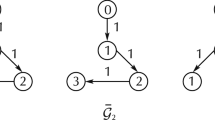Abstract
This paper is devoted to consensus tracking algorithm via observer-based distributed output feedback with adaptive coupling gains for leader-follower multi-agent systems under arbitrary switching topology. The full state of neighboring followers in our work is not available, and the leader’s input might be nonzero and bounded generally. We design the actual observer and adaptive coupling gains to ensure the consensus tracking in a fully distributed fashion for the connected switching topologies. Both the observer gain and feedback gain are determined simultaneously. Sufficient conditions for the multi-agent system to reach consensus are obtained in terms of linear matrix inequalities by a cone complementary linearization technology. An illustrative example is provided to validate the theoretical results.





Similar content being viewed by others
References
Y.Y. Cao, J. Lam, Y.X. Sun, Static output feedback stabilization: an ILMI approach. Automatica 34, 1641–1645 (1998)
Y.H. Chang, C.W. Chang, C.L. Chen, C.W. Tao, Fuzzy sliding-mode formation control for multirobot systems: design and implementation. IEEE Trans. Syst. Man Cybern. B Cybern. 42, 444–457 (2012)
W.J. Dong, J.A. Farrell, Cooperative control of multiple nonholonomic mobile agents. IEEE Trans. Autom. Control 53, 262–268 (2009)
L.E. Ghaoui, F. Oustry, M. AitRami, A cone complementarity linearization algorithm for static output-feedback and related problems. IEEE Trans. Autom. Control 42, 1171–1176 (1997)
D. Hammel, Formation flight as an energy saving mechanism. Isr. J. Zool. 41, 261–278 (1995)
K. Hengster-Movric, K.Y. You, F.L. Lewis, L.H. Xie, Synchronization of discrete-time multi-agent systems on graphs using riccati design. Automatica 49, 414–423 (2013)
Y.G. Hong, G.R. Chen, L. Bushnell, Distributed observers design for leader-following control of multi-agent networks. Automatica 44, 846–850 (2008)
R.A. Horn, C.R. Johnson, Matrix Analysis (Cambridge University Press, Cambridge, 1985)
J. Huang, S.M. Farritor, A. Qadi, S. Goddard, Localization and follow-the-leader control of a heterogeneous group of mobile robots. IEEE/ASME Trans. Mechatron. 11, 205–215 (2006)
H.K. Khalil, Nonliear Systems (Prentice Hall, Englewood Cliffs, NJ, 2002)
Z.K. Li, X.D. Liu, W. Ren, L.H. Xie, Distributed tracking control for linear multi-agent systems with a leader of bounded unknown input. IEEE Trans. Autom. Control 58, 518–523 (2013)
Z.K. Li, W. Ren, X.D. Liu, L.H. Xie, Distributed consensus of linear multi-agent systems with adaptive dynamic protocols. Automatica 49, 1986–1995 (2013)
P. Lin, Y.M. Jia, Distributed rotating formation control of multi-agent systems. Syst. Control Lett. 59, 587–595 (2010)
Y. Liu, Y.M. Jia, Robust \(H_{\infty }\) consensus control of uncertain multi-agent systems with time delays. Int. J. Control Autom. Syst. 9, 1088–1093 (2011)
Y. Liu, K.M. Passino, M.M. Polycarpu, Stability analysis of m-dimensional asynchronous swarms with a fixed communication topology. IEEE Trans. Autom. Control 48, 76–95 (2003)
S. Liu, L.H. Xie, H.S. Zhang, Distributed consensus for multi-agent systems with delays and noises in transmission channels. Automatica 47, 920–934 (2011)
R.C. Luo, T.M. Chen, Development of a multi-behavior based mobile robot for remote supervisory control through the Internet. IEEE/ASME Trans. Mechatron. 5, 376–385 (2000)
P. Millán, L. Orihuela, C. Vivas, F.R. Rubio, Distributed consensus-based estimation considering network induced delays and dropouts. Automatica 48, 2726–2729 (2012)
W. Ni, D.Z. Cheng, Leader-following consensus of multi-agent systems under fixed and switching topologies. Syst. Control Lett. 59, 209–217 (2010)
R. Olfati-Saber, R.M. Murray, Consensus problem in networks of agents with switching topology and time-delays. IEEE Trans. Autom. Control 49, 1520–1533 (2004)
R. Olfati-Saber, Flocking for multi-agent dynamic systems: algorithms and theory. IEEE Trans. Autom. Control 51, 401–420 (2006)
W. Ren, R.W. Beard, Consensus seeking in multiagent systems under dynamically changing interaction topologies consensus seeking in multiagent systems under dynamically changing interaction topologies. IEEE Trans. Autom. Control 50, 655–661 (2005)
E. Semsar-Kazerooni, K. Khorasani, Optimal consensus algorithms for cooperative team of agents subject to partial information. Automatica 44, 2766–2777 (2008)
H. Shi, L. Wang, T. Chu, Swarming behavior of multi-agent systems. J. Control Theory Appl. 2, 313–318 (2004)
Y.F. Su, J. Huang, Stability of a class of linear switching systems with application to two consensus problems. IEEE Trans. Autom. Control 57, 1420–1430 (2012)
J.X. Xi, Z.Y. Shi, Y.S. Zhong, Output consensus analysis and design for high-order linear swarm systems: partial stability method. Automatica 48, 2335–2343 (2012)
W.W. Yu, W. Ren, W.X. Zheng, G.R. Chen, J.H. Lü, Distributed control gains design for consensus in multi-agent systems with second-order nonlinear dynamics. Automatica 49, 2107–2115 (2013)
H.W. Zhang, F.L. Lewis, A. Das, Optimal design for synchronization of cooperative systems: state feedback, observer and output feedback. IEEE Trans. Autom. Control 56, 1948–1952 (2011)
Acknowledgments
This work was supported by the Natural Science Foundation of China (Grant No. 61374137) and Stat Key Laboratory of Integrated Automation of Process Industry Technology and Research Center of National Metallurgical Automation Fundamental Research Funds (2013ZCX02-03).
Author information
Authors and Affiliations
Corresponding author
Rights and permissions
About this article
Cite this article
Jiang, Y., Liu, J. & Wang, S. Consensus Tracking Algorithm Via Observer-Based Distributed Output Feedback for Multi-Agent Systems Under Switching Topology. Circuits Syst Signal Process 33, 3037–3052 (2014). https://doi.org/10.1007/s00034-014-9792-7
Received:
Revised:
Accepted:
Published:
Issue Date:
DOI: https://doi.org/10.1007/s00034-014-9792-7



